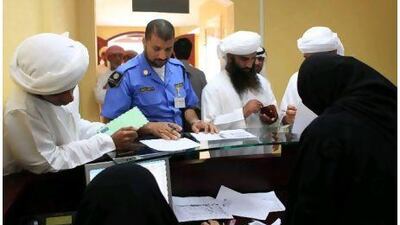DUBAI // The practical aspects of calculating the proper amount of alms were the main topic of discussion at a workshop organised by the Zakat Fund.
Accountants from public and private trading enterprises as well as charity associations took part in the 12th session on zakat jurisprudence and accounting, which was held at Dubai Chamber of Commerce and Industry. The workshop, which began Sunday, will wrap up today.
Zakat, a form of welfare contribution, is the third pillar of Islam and requires Muslims to give a percentage of their wealth to the poor and needy. The four-day workshop addressed a broad range of topics related to calculating zakat, including payments on assets such as jewellery, cash and stocks.
"It is not enough to acknowledge that zakat and salat [prayer] are one of the five pillars of Islam," said Dr Essam al Nasr, who heads the accounting department at Al Azhar University in Egypt. "What is even more important is knowing how to perform prayer and give zakat correctly."
Most believers are familiar with zakat al fitr, or alms given to the poor and needy at the end of the Ramadan fast. Not many know how to calculate zakat al mal, an annual percentage paid on the amount of wealth that a person or company accumulates in a given year, which is generally fixed at 2.5 per cent on wealth and goods used for trade.
"A person or company who have assets and surplus wealth owe an amount of zakat, which is contributed at a different time of the year by each entity," Dr al Nasr said. "This ensures that the poor have a constant stream of assistance."
Abdullah al Muhairi, the Zakat Fund secretary general, stressed the importance of providing lectures on jurisprudence and accounting of zakat amid what he said was a lack of detailed information on the subject. He emphasised the fund's role in increasing awareness and creating an equitable society.
"Although accountants may be highly trained in their field, zakat jurisprudence is governed by its own set of rules," he said. "Some may not have been trained in the subject."
Giving such lectures fulfilled one of the fund's strategic objectives, which was spreading awareness and educating people across the Emirates about the correct methods of calculating zakat, Mr al Muhairi said.
"We do not measure the work of the Zakat Fund with money, but with the growing knowledge and awareness of individuals to help others," he said. "When 100 individuals apply the principles taught to their companies and tell family and friends, we see it as the whole community reaping benefits in the long term."
Among other topics discussed during the workshop was how to calculate zakat on assets such as bonds, goods in storage, savings and capital wealth. Other pertinent issues included paying zakat on crops and livestock. Dr al Nasr emphasised the importance of paying the tithe after 12 months, or 354 days in the Islamic calendar.
"This span of time is enough for a business to absorb and experience the seasonal changes and fluctuations that occur," he said. "Zakat has to come out of the profit that a company or individual makes. It has to come out of an individual's willingness to give without any hardship to the giver or receiver."
This contribution becomes obligatory for a Muslim after a certain level of assets or wealth, referred to as the nisab, is achieved. The indicator ensures that individuals are not forced to give what they themselves do not have.
The Zakat Fund aimed to benefit financial managers, accountants, businessmen, students and members of society in both the private and public sector through the event, said Mr al Muhairi.
More than 2,000 participants have participated in the previous sessions organised by the Zakat Fund.
Shayma Maher Jouda, a 21-year-old finance and banking student, was confident the workshop would help her.
"The session was really beneficial because it taught us the correct ways to implement the zakat," said Ms Jouda. "It helps me in my graduation thesis this year because there was information conveyed that I was not aware of before."

